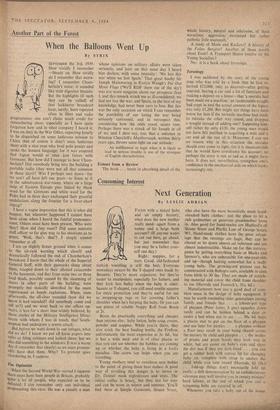Another Part of the Forest
• When the Balloons Went Up
I have a vague impression that this is what did happen; but whatever happened I cannot have been alone when I heard the fateful pronounce- ment. Others must, have been present. Who were they? How did they react? Did some neurotic staff officer so far giye way to his emotions,as to grunt, 'Well, that's that'? I simply cannot remember at all.
I am qn slightly firmer ground when it 'comes to the air-raid warning which closely and dramatically followed the end of Chamberlain's broadcast. I know that the whole of the Imperial General Staff, with their gasmasks slung about them, trooped down to their allotted catacombs in the basement, and that from mine two or three loud thuds, possibly caused by the slamming of doors in other parts of the building, were Promptly but stoically identified by the more experienced as bomb explosions. When, soon afterwards, the all-clear sounded (how did we know it had sounded? did somebody come and tell us?) and we went back to our offices up- stairs, it was for a short time widely believed, by those circles of the Military Intelligence Direc- torate with whom I was in touch, that 'South- ampton had undergone a severe attack.
But before we went down to our refuges, what did we do? I know we put all loose papers into safes or filing cabinets and locked them; but we also did something to the windows. It was a warm day (I remember that clearly) so we must presum- ably have shut them. Why? To prevent spies Clambering in, I suppose.
The Optimists When the Second World War started I suppose there must have been people in Britain, probably quite a lot' of people, who expected us to be defeated. I can remember only one individual Propounding this view. He was a pundit, a man
Whose opinions on military affairs were taken seriously, and later on that same day I heard him declare, with some intensity; 'We lost this war when we lost Spain.' That great booby Sir Joseph Mainwaring in Evelyn Waugh's Put Out More Flags ('We'll RDF them out of the sky') was not more sanguine about our prospects than I, and this remark struck me as ill-considered; we had not lost the war, and Spain, to the best of my knowledge, had never been ours to lose. But this was the only occasion on which I can remember the possibility of our losing the war being' seriously canvassed, and in retrospect this, considering how the odds stood, seems rum. Perhaps there was a streak of Sir Joseph in all of us; and I dare say, too, that a sentence in Winston Churchill's Marlborough, written thirty years ago, throws some light on our attitude: An indifference to logic when it is likely to lead to serious trouble is one of the strongest of English characteristics.
Extract from a 'Review The book . . . treats in absorbing detail of the whole history, natural and otherwise, of these voracious, aggressive; ' oversexed but rather pathetic little mammals.'
A study of Mods and Rockers? A history of the Polies Bergere? Another Of those novels about Eton? A Transport House treatise on the Young Socialists?
No: it is a book about lemmings.
Zeroology
I was saddened by the story of the young man who was told by a bank that he had in- herited £12,000, only to discover—after getting married, buying a car and a lot of furniture and making a deposit on a house—that 'a mistake had been made on a machine,' an inadmissible nought had crept in and the actual amount of the legacy was only £1,200. But might not things have been worse'for him if the versatile machine had made its mistake the other way round, and dropped a nought instead of adding. one? Supposing him- self richer by only £120, the young man would not have felt. justified in acquiring a wife and a car and all the rest of it. Moreover, I can see no reason why in this •situation the mistake should ever come to light,, for it is inconceivable that he would have .overdrawn his account; so perhaps the story is not as sad as it might have been. It does not, nevertheless, strengthen one's confidence in the mechanical aids on which banks increasingly rely.






































 Previous page
Previous page